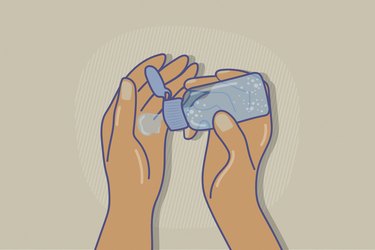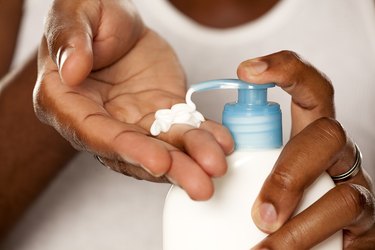
In the era of COVID-19, hand sanitizer has been a must-have. When you're out getting groceries or at the post office, without access to soap and water, a squirt of hand sanitizer obliterates pathogens — including the novel coronavirus — upon contact.
"The alcohol in hand sanitizer breaks down the bacterial wall and kills the contents," explains Soma Mandal, MD, an internist at Summit Medical Group in Berkeley Heights, New Jersey.
Video of the Day
Not only is it fast and effective, but hand sanitizer is very convenient — you can easily stash it in your pocket, handbag or glove compartment. Still, despite these advantages, there are some less than ideal repercussions of living in a sanitizer-saturated world, from dry hands to, ironically, compromised immunity. Here's a closer look at some potential outcomes of frequent hand sanitizer use.
Get tips on how to stay healthy, safe and sane during the novel coronavirus pandemic.
It Might Make You More Prone to Diarrhea

Your microbiome is an ecosystem of microorganisms — including bacteria, fungi and viruses — that live in your gut, mouth and nose and on your skin, per the Harvard T.H. Chan School of Public Health. It plays a major role in keeping you healthy, preventing infection and warding off harmful bacteria.
"The hands are a critical vector for transmitting microorganisms between people, pets, inanimate objects and our environments," according to a July 2015 review in the Journal of Dermatological Science.
While hand sanitizer slays most bad bacteria, it also wipes out the helpful kind.
"When you kill the colonies of good bacteria on your hands, it also destroys your gut microbiome, which feed off the bacteria on your skin," says Mahboobeh Mahdavinia, MD, PhD, associate professor of allergy and immunology at Rush University. "Changing your microbiome in this way weakens your immune system."
Over time, this might leave you vulnerable to bacteria that can irritate your GI tract and give you tummy trouble. "You can enhance the good bacteria in your body by eating yogurt, taking a daily probiotic and spending time in nature — like gardening or hiking," Dr. Mahdavinia says.
And rest assured: Disinfecting your hands won't have a lasting impact on your immune function. "Mere hours after using sanitizer, the bacteria start to recolonize," Dr. Mahdavinia says.
Related Reading
It Doesn’t Always Get the Job Done
Hand sanitizer fails to annihilate the diarrhea-causing pathogens Clostridium difficile (C. diff), norovirus and Cryptosporidian, according to the Centers for Disease Control and Prevention (CDC).
And while it might remove germs from slightly soiled hands, the CDC maintains that sanitizer doesn't hold a candle to soap and water if your mitts are super grimy or greasy (think: after gardening, eating ribs or cleaning the gutters). "Hand sanitizer won't remove particles of food or visible dirt," Dr. Mandal says.
Hand sanitizer may not be able to remove harmful chemicals, such as pesticides, per the CDC.
"I promote hand sanitizer use only in a hospital or clinical setting, or as a remedy between hand washings," Dr. Mandal says.
Tip
Use soap and water when washing your hands, but skip the antibacterial soap, which isn’t necessary unless you’re in a hospital or clinic, Dr. Mandal says.
It Can Dry Out Your Hands

That bottle of sanitizer can turn your palms into the Sahara.
"Alcohol removes moisture from your skin, and with consistent use can lead to dryness, cracking and even eczema — especially in children, since their skin is so sensitive," Dr. Mahdavinia says.
Hand sanitizer is more disruptive to the skin barrier than vigorous washing with soap and water, Dr. Mandal says. "The alcohol causes irritation," she says. "Raw, broken skin leaves you more vulnerable to infection."
The fix: "Apply moisturizer after using hand sanitizer to seal hydration into your skin," Dr. Mahdavinia says. She recommends hypoallergenic products that are thick enough to create a solid barrier on the skin, such as Cetaphil, Eucerin or Vaseline.
Related Reading
It Can Hurt Your Baby's Developing Immune System
A child's immune system forms during the first year of life. A popular scientific theory called "the hygiene hypothesis" posits that exposure to pathogens and bacteria is vital to helping infants build strong, well-functioning immunity.
"The hygiene hypothesis suggests that a newborn baby's immune system must be educated so it will function properly during infancy and the rest of life," according to the U.S. Food and Drug Administration (FDA).
In a too-clean environment, the hypothesis is that babies won't get "the necessary exposure to germs required to educate the immune system so it can learn to launch its defense responses to infectious organisms," per the FDA. Remember, the hygiene hypothesis is a theory, and one that's still being debated, per the Cleveland Clinic — that is, you should still keep up good hygiene habits.
"If you're pushing around a grocery cart, you need to clean your hands before handling your baby, but if possible, wash your hands instead of using hand sanitizer," Dr. Mahdavinia says. "Because an infant's microbiome is still forming, touching them when you have alcohol or Lysol residue on your hands will kill the good germs on their skin."
Being super sanitary is necessary to prevent the spread of the novel coronavirus, but luckily there are research-sanctioned options to combat the potential ill effects of over-hygiene on your child's microbiome. For instance, breastfeeding helps an infant's gut microbiome mature, per a study published in July 2017 in JAMA Pediatrics.
Some Sanitizers Are Healthier Than Others
The next time you’re shopping for sanitizer, select one with ethanol (aka ethyl alcohol) as the active ingredient. Opt for hand sanitizers with at least 60 percent alcohol, per the CDC.
“Your body can break down ethanol, so even if you accidentally ingest trace amounts, it won’t have a toxic effect,” Dr. Mahdavinia says. “Other ingredients, such as isopropyl alcohol, which is often added to ethanol, could be toxic if ingested,” or if enough is absorbed through the skin. Isopropyl alcohol can also cause damage if it’s sprayed on clothing and surfaces.
So, How Bad Is It Really to Use Hand Sanitizer All the Time?
Squirting on sanitizer isn't ideal, but the benefits of combatting the novel coronavirus outweigh the risks.
"Until we have a remedy for the virus, we have to be super cautious," Dr. Mahdavinia says. "I have hand sanitizer in my car and in every bag."
Although Dr. Mahdavinia relies on sanitizer when she's out and about, as soon as she gets home, she washes her hands with soap and water for 25 seconds. She doesn't pull out hand sanitizer again until she leaves the house. "It's not a good trade-off, but for the time being we have to bear with the consequences," she says.
Concerned About COVID-19?
Read more stories to help you navigate the novel coronavirus pandemic:
- U.S. Food & Drug Administration: "Asthma: The Hygiene Hypothesis"
- Cell Research: "Early exposure to germs and the Hygiene Hypothesis"
- Annals of the American Thoracic Society: "The Hygiene Hypothesis in the Age of the Microbiome"
- JAMA Pediatrics: "Association Between Breast Milk Bacterial Communities and Establishment and Development of the Infant Gut Microbiome"
- Journal of Dermatological Science: "Review of human hand microbiome research"
- National Center for Biotechnology Information: "Guide to appropriate hand hygiene in connection with Clostridium difficile spread"
- CDC: "Show Me the Science – When & How to Use Hand Sanitizer in Community Settings"
- Harvard T.H. Chan School of Public Health: "The Microbiome"
- Cleveland Clinic: "Can Being Too Clean Weaken Your Immune System?"
Is this an emergency? If you are experiencing serious medical symptoms, please see the National Library of Medicine’s list of signs you need emergency medical attention or call 911.
